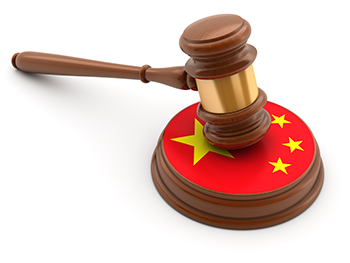The legal representative office (LRO) is one of a handful of special representative offices (ROs) with unique characteristics in China. These special ROs are usually established in China’s restricted industries, within which foreign investors are not allowed to set up a wholly foreign-owned enterprise (WFOE) and sometimes not even a Sino-foreign joint venture (JV), as is the case in the legal services industry.
Effectively, the LRO structure allows foreign law firms to perform their legal services in China while the parent company overseas assumes civil liabilities for the activities of its LRO in China. Key differences set the LRO structure apart from traditional ROs, differences that range from the RO registration process to the entity’s business scope, and from the different accounting and tax practices they must follow to the funding mechanisms available to grow their operations.

Establishment Procedures
Unlike a traditional RO, which obtains its registration certificate from the Administration of Industry and Commerce (AIC), the establishment of an LRO requires obtaining permission from the Administrative Department of Justice of the State Council. To obtain such permission, the foreign law firm will have to first meet a number of requirements, including the following:
- It must be a law firm legally engaged in the profession in its own country and must not have suffered sanctions there
- There is an actual need to establish such LRO to develop their legal services in China
- The LRO’s chosen representatives must meet certain special requirements, which will be discussed later in this article
Some of the supporting documents the parent law firm should provide in its application to register an LRO in China include:
- An application form
- Documentary evidence of the law firm’s establishment
- The partnership agreement or the Articles of Association of the foreign law firm
- A certificate of authorization given to each proposed representative of the LRO
- Documentary evidence of the legal qualifications of each of the proposed representatives
Furthermore, there are additional requirements to be met should the foreign firm intend to establish more than one LRO in China. Meanwhile, all official documents should not only be notarized and legalized in the home country, but also translated into Chinese and presented in triplicate.
When all the documents are duly prepared, they must be presented to the administrative department of justice at the provincial level where they will be examined within three months. Once this preliminary examination has been concluded, the documents will be handed over together with comments made by the local authority to the Administrative Department of Justice of the State Council, the authority at the national level responsible for making the decision of whether to approve the application. The deliberation process typically takes at least six months. If approval is secured, the LRO will be issued its practicing license.
After completion of this approval process of about nine months, the LRO should present the entity’s practicing license and other relevant certificates to the administrative department of justice at the provincial level in order to conclude the local registration formalities. This final registration typically takes about two working days and should be renewed on an annual basis. Once the LRO has been duly registered, relevant taxation, banking, and foreign currency formalities will need to be handled before the entity becomes operational and starts delivering legal services.
LRO Business Scope
LROs have a broader business scope than traditional ROs, which are typically restricted to conducting marketing, liaison, and quality control activities on behalf of the parent entity. Their wider scope allows LROs to engage in and bill for legal services.
The main activities an LRO can typically engage in include:
- Providing legal advice on the laws of the countries where the legal practitioners of the foreign law firm have obtained permission to provide legal services
- Providing advice on international treaties and conventions
- Commissioning to handle matters relating to the laws of the countries where the legal practitioners of the foreign law firm have obtained permission to provide legal services
- Commissioning Chinese law firms on behalf of foreign clients to handle matters related to Chinese laws
- Providing information on the impact of China’s legal environment, which shall not include specific recommendations or opinions on the application of Chinese law
Despite this wider range of permitted activities, the LRO’s business scope remains limited if compared to the activities a fully independent consulting company is able to provide. Indeed, the LRO and its employees are strictly prohibited from providing services relating to Chinese legal matters, even in the name of a third-party Chinese practitioner.
Other activities expressly prohibited for an LRO include:
- Investment into, management of, or control of, a Chinese law firm
- Establishment of a JV with a Chinese law firm or Chinese legal practitioner with shared profits and risks
- Establishment of a joint office with a Chinese law firm
- Sending staff to a Chinese law firm to engage in the provision of legal services
Notwithstanding, mutual assignment of lawyers as legal counsel between Chinese and foreign law firms is permitted in the Shanghai Pilot Free Trade Zone, as well as the establishment of JVs between Chinese and foreign law firms.
LRO Representatives and Other Employees
The LRO structure, like the traditional RO, does not allow the direct employment of local employees. Instead, local employees must be hired through a labor dispatch agency. Additionally, LROs are further restricted staffing-wise in the sense that their local employees can only be hired as supporting staff; the local staff cannot be Chinese legal practitioners, nor are they allowed to provide legal services.
Regarding the position of the LRO representatives, there are again a few distinguishing features compared to a traditional RO. To start, the foreign law firm must appoint one chief representative and one or several general representatives, who should meet certain criteria such as being practicing lawyers and members of the lawyer association of their home country, have at least two years of experience practicing law outside of China, and have not suffered sanctions or criminal penalties. Moreover, the chief representative has to have at least three years of experience and hold the title of Partner of the foreign firm, or otherwise be a senior staff member holding a similar position.
Another special characteristic of the position of the LRO chief representative is that a foreign lawyer cannot hold representative positions in two or more representative bodies, meaning that if the foreign firm has more than one LRO in China, it will need to appoint different chief representatives to each office.
Meanwhile, the representatives of an LRO would be required to occupy full-time functions, meaning that they would typically be expected to be staged in China for a duration of at least six months each year. In practice, during the annual inspection, the competent authority may ask to see evidence that the representatives have stayed in China for six months or more during the calendar year. Otherwise, the LRO may not be able to register the representatives for the following year.
A Complex Establishment Process
The LRO is a hybrid structure, with traits of the traditional RO and the profit-making limited liability company. A broader business scope, allowing for revenue-generating activities, opens the door to unique opportunities, but also complicates the bookkeeping and tax filing functions that are normally straightforward for the traditional RO, which will be addressed in part two of this article in a later issue. Before the structure is even set up, the parent law firm will have to go through a particularly long and complex incorporation process.
The unusual characteristics of the LRO structure, together with the relative scarcity of this structure, makes it one of the most difficult types of ROs to set up, and it is not uncommon for even the local authorities to be unsure of what guidelines apply to the LRO. As such, the key to the efficient setup and management of an LRO could very well be seeking counsel from an advisor experienced with establishing LROs and equipped to assist them with daily management of accounting and tax functions.
Stay tuned for Part 2 of this article, which will explore taxation and funding issues for LROs.
 Adam Livermore is an equity partner at Dezan Shira & Associates. He manages Dezan Shira & Associates’ Dalian, Qingdao, and India offices, while leading the team providing integrated payroll processing services to clients across China, Vietnam, India, Hong Kong, and Singapore. He also has a particular specialization in the area of human resources in China.
Adam Livermore is an equity partner at Dezan Shira & Associates. He manages Dezan Shira & Associates’ Dalian, Qingdao, and India offices, while leading the team providing integrated payroll processing services to clients across China, Vietnam, India, Hong Kong, and Singapore. He also has a particular specialization in the area of human resources in China.